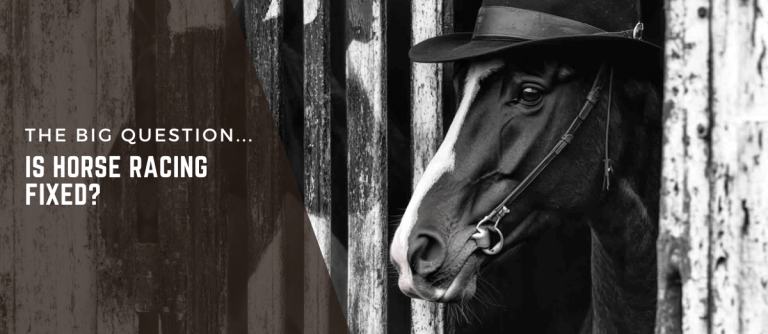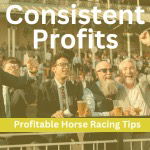Is Horse Racing Fixed?

Contents
Does Cheating in Horse Racing Exist?
You’ve probably heard the apocryphal story from decades ago, a punter is leaning on the rails at the unsaddling enclosure after a 2 year old maiden race. As the jockey dismounts the trainer enquires how the horse had shaped in the race.
“Well I could’ve beaten those in front of me but I’m not sure about the ones behind me.”
Let’s be frank, a certain amount of skulduggery has existed since racing began. But is there enough for punters to be concerned about and if so how can we take steps to identify the protagonists and differentiate between outright cheating and clever management by connections.
Let’s look at an example of the latter. At the Cheltenham Festival in 2023 Langer Dan won the Coral Cup, a competitive major handicap race, under Harry Skelton at 9/1 off a rating of 141. He subsequently had 4 further runs, going off at 10/1, 40/1, 40/1 and 66/1 without showing any form at all. In March of 2024 he turned up at the Coral Cup, reunited with Skelton and racing again off 141 it won at 13/2. My young companion was incandescent with rage, accusing connections of all manner of terrible things. No, I didn’t back it but it wasn’t difficult to identify it’s chances despite 4 poor previous runs. Was the race fixed? No. I’m certain there were plenty of others in the field that had similar preparations but on the day the Skeltons got it right.
It would be naive to think that every horse in every race runs to it’s maximum ability, but by studying the modus operandi of trainers it is possible to avoid certain types of races and horses that are not running in ideal conditions. Would you back a 2yo, trained by Sir Mark Prescott, making it’s debut over 5 furlongs that is a big price in the market? Nobody is accusing the trainer of cheating but it’s fair to say he’s looking to acquire a favourable handicap rating to exploit as the horse matures and runs over further.
By googling Keiran Fallon and Danny Brock, among others, you’ll see that investigations have thrown up suspicious activities by jockeys and connections with varying outcomes.The vast majority of these circumstances occur in lower grade racing that attract very little publicity and tend to involve smaller stables struggling for winners. All the while gambling exists people will try to exploit opportunities by fair means or foul. Avoiding races with limited available information is a good start in minimising exposure to potential cheating.
In the last few decades the surveillance of horse racing has improved in many ways. All races are televised and analysed, the authorities are extra vigilant in their scrutiny and bookmakers cooperate far more than previously in reporting abnormal patterns. It’s impossible to eliminate criminality entirely but it’s far more difficult nowadays to influence the outcome of a race.
What is a Fixed Race?
Fixing an entire horse race is virtually impossible, the number of people involved and the different permutations are infinite. And of course it is far easier to make a horse run slowly than it is to make it run fast. The definition of a fixed race is not one where the outcome is predetermined, it’s where one or more runners will not be performing to the best of their ability. This clearly presents betting opportunities because if the second favourite is not running to it’s best the favourite has an improved chance of winning, and vice versa. For some, the temptation to manipulate races is tied to the potential profits from large combination wagers placed on known outcomes
Fixed-odds betting, also known as fixed-odds horse racing, should not be confused with a fixed race. This another type of odds wagering, like pari-mutuel wagering is a type of odds wagering. Fixed-odds betting ensures that punters know their potential returns before placing a bet, unlike other systems where odds fluctuate after betting. The introduction of online betting exchanges theoretically made it possible to ensure a horse didn’t run to it’s best and lay it, knowing you were guaranteed to make money. However in order to maintain their integrity and that of racing, the betting exchanges are very vigilant in monitoring suspicious betting patterns.
The Different Types Of Cheating in Horse Racing
Doping
Doping a racehorse to either improve or negate performance is in theory the easiest method of influencing the outcome of a race as only one person needs to be involved i.e. the one administering the drug. Back in 2013 Mahmood al-Zarooni, the retained trainer of over 200 horses in Great Britain for the Godolphin operation of Sheikh Mohammed bin Rashid Al Maktoum, pleaded guilty to a systematic and widespread misuse of anabolic steroids at his stables. The chief executive of the British Horseracing Authority (BHA) arrived unannounced at the stables and tests showed anabolic steroids in the horses. The trainer was banned from any involvement in racing for 8 years, a career ending outcome. The British Horseracing Authority takes and tests samples from approximately 8,000 horses each year, a substantial amount. In 2018 two men were banned from racing for 10 years after administering beta blockers to Ladies First in a race at Newcastle. Starting as favourite, the horse ran inexplicably badly and tests were carried out. Asserting that the doping of horses is obsolete would be naive, but establishing when it is likely to occur is impossible.
Race-Fixing
Predicting the outcome of horse races has fascinated us for centuries, being in a position to influence the result is intoxicating for some. Bribery, coercion, reward, all have been used by unscrupulous people. Being a jockey is not financially rewarding for most riders, with many only earning significant sums when winning races with large prize money, it’s a demanding and dangerous job that involves huge sacrifice. Being easy on a horse, racing wide, starting slowly, finding trouble in running, there are numerous ways of deliberately losing a race that go undetected other than by trained eyes. As discussed earlier, due to the scrutiny involved it has become far more difficult to execute. It’s also impossible to state with any confidence the extent of the problem and what goes on unknown. Recently, Royston Cooper and his son Royston Barney were banned for a combined 13 years after being found guilty of instructing jockey Ray Dawson not to win on their runner Enough Already at Yarmouth in 2022. Dawson won the mile race by a head and reported to stewards that he was allegedly threatened by the pair afterwards. An example of race fixing gone wrong and a huge deterrent to others.Dawson was also suspended for not reporting the approach beforehand.
Ring-in
In UK we would recognise this as a “ringer”, the practice of substituting one horse for another. While this is more common in flat races, it can theoretically happen in any type of race. Probably the most famous example occurred in 1982 when trainer Steven Wiles, who had gone 2 years without a winner, entered his horse Flockton Grey in a 2 year old race. He cunningly sent an identical looking horse, 3 year old Good Hand, in Flockton Grey’s place and it won by 20 lengths at 10/1, netting around £20,000 in bets. Suspicious officials conducted veterinary tests and their cover was blown resulting in huge fines and a jail sentence. The introduction of horse passports and microchips has hugely reduced the possibility of this happening, however in 2021 Aidan O’Brien was fined £4,000 after his two horses in a race were incorrectly saddled and ridden by the wrong jockeys. An honest error which proves that the system isn’t foolproof.
Sabotage
Sabotage effectively covers every aspect of race fixing, deliberately injuring a horse before a race is one example, doping and influencing jockeys are others. Deliberately injuring a horse or other rider during a race is virtually unheard of and dangerous or reckless riding are both met with harsh punishments. Vets at the track are unlikely to let an obviously lame horse run, as the rules of racing prioritise the welfare of the horses and the integrity of the sport.
How Are Races Fixed?
As already discussed, the lure of perceived easy money has always attracted certain criminal types to racing. It’s important to differentiate between deliberate fixing by various means and identifying which horses are entered in races that the trainer knows it can’t win. There’s a saying in poker “If you don’t know who the mug is after one hand then it’s you”. Don’t make excuses for your own ignorance or lack of research by accusing all and sundry of cheating after a horse runs better or worse than you anticipated. Occasionally, races will be affected by questionable motives, usually in the lower echelons of the sport where trainers and jockeys need money. The single biggest influence on a horse’s performance is the trainer. He is responsible for it’s fitness, well-being and which races it runs in, so study patterns and don’t confuse race fixing with the management and placing of racehorses.
How Common Are Fixed Horse Races?
Nobody knows the precise answer to this question, jockeys and trainers are continuously interviewed by stewards, and factors like race times, sectional splits, and betting patterns are analysed for discrepancies. They are also asked to explain the performance of their horses. Bans and fines are regularly handed out, usually to jockeys for trying too hard as opposed to trying NOT to win. Betting shop regulars are convinced that the outcome of every other race is pre ordained, which says more about their success as punters than the veracity of their statements. Low quality horses, which are by their nature inconsistent, at the smaller tracks are where most issues arise. Most serious punters won’t be looking at this type of racing as a source of long term profit.
Horse racing regulations vary across different jurisdictions, with places like Hong Kong maintaining some of the strictest anti-corruption policies in racing.
How To Spot A Fixed Horse Race
There are two aspects to this: before and after. Before the race, market movements are an obvious indicator, when betting on horse racing, of whether or not a horse is fancied, a horse drifting on the exchanges indicates somebody is prepared to lay it. A horse’s board price can indicate confidence from connections, as sharp fluctuations suggest inside knowledge on its chances. That doesn’t mean the race is fixed, but suggests somebody has information not in the public domain.The same applies to a horse being heavily backed, especially if there is no apparent reason in the form book.
After the race will test your ability as a race reader; were any of the horses not put into the race with a chance? Forced to run wide? Met trouble in running? Run well from a poor draw? And most importantly did the jockey achieve the best possible finishing position? The ability to differentiate between race fixing and incompetence is crucial when assessing a race.
How Do You Beat Fixed Horse Racing?
“Beating” fixed horse racing means working on the assumption that racing is institutionally corrupt, and there is no evidence to suggest this is the case. At the bottom end, with trainers, their staff, jockeys and owners struggling to make ends meet it will be far more prevalent. But in hindsight the vast majority of races aren’t a total surprise, and by concentrating on Class D and above the transparency and available information is available to us all.
Understanding the difference between form cycles, types of bets and race manipulation is essential for serious bettors. One betting term worth noting is ‘steamer,’ which refers to a horse that shortens significantly in the market, but does not necessarily mean the race is fixed. By analysing the stages of a horse’s preparation, experienced bettors can identify patterns that indicate when a horse is being primed for a win.
The Consequences of Being Caught
Being warned off, banned, fined or suspended have serious implications for trainers and jockeys. In terms of risk and reward even the most irresponsible would need a serious temptation to jeopardise their careers. Some high profile names have previously been involved but as scrutiny has improved racing is cleaner than ever before. The vast majority of bad rides are human error not corruption.
FAQ
Why Don’t Horses Always Perform To Their Best?
Numerous factors: unsuitable ground or distance, running when not fully fit, track preference, jockey error, illness in yard. Most, if not all of this information is readily available, if not always apparent before the race!
Why Do Some Jockeys Not Seem To Be Trying As Hard as Others?
Jockeys have different racing styles, watching Jamie Spencer motionless at the back of the field can be the most frustrating thing to endure, but you backed the horse knowing how he’d ride it. Last weekend Oisin Murphy went to Newcastle to ride just two horses, they both won. Regardless of the result it was fair to assume they were fit and ready to run. I’ve just watched a claimer nearly fall off a horse riding a finish, that sounds unkind but anybody who backed the horse must take jockeyship into account. The lad was trying his best, he’s just inexperienced. Jockeys are like every other profession, some are better than others and success breeds confidence. I’m not qualified enough to comment on horsemanship however I believe that in the vast majority of races the jockey would rather win than not, the art of race reading is in establishing why they did or didn’t.
Why Is Horse Racing So Unpredictable?
Let’s never forget we’re dealing with animals, have you ever taken a puppy for a walk on a lead? Now compare that to sitting on half a ton of racehorse – the mystery to me is how consistent they are and how reliable the form book is. The horse doesn’t know how long the race is, where the winning line is or indeed if it’s in the lead. It is simply responding to the rider steering it and urging it forward, there is no way of us knowing for certain if the horse is running as fast as it can or simply just running. Horses are flight animals, perhaps they only run flat out when faced with perilous danger and not because a small man is hitting it with a felt covered whip. When you think about it, predicting which animal will run round a field the fastest is a ridiculous pastime, but it fascinates us nonetheless.
Conclusion
The title of this article would be met with differing responses in different circles. Betting shop regulars are convinced everyone involved in racing is a crook and will offer every beaten favourite as evidence. It would be naive to suggest the game is 100% straight, but in assessing a race you have to either believe it is or establish beyond doubt that it isn’t. Ryan Moore riding the Derby favourite is an example of a horse running with the sole intention of winning the race. Every day there are dozens of examples of horses that can’t win the race they’re entered in, if you’re continually backing them don’t blame race fixing. And there’s plenty more that don’t win races they should due to human error, for the same reason that people crash cars or spill drinks.
The horse racing industry has worked hard to minimise corruption, but no sport is completely immune to unethical behaviour. Yes, race fixing exists and always has, but it’s not the reason you can’t pick winners.












Hi, I do sometimes think there are fixed races. Take the 9/12/24 12.30 Lingfield Full Confession, which was odds-on favourite at 2/7 but came last, and an 18/1 Foxlight won. I didn’t bet on that race, but some strange results happen that you can’t understand. Steve.
Hi Steve, you may well be right, it would be naive to believe that any sport is 100% straight and racing is no different. Do the betting patterns in that race suggest something untoward ?
It’s a common misconception that racing is fixed whenever results don’t align with the odds, but that perspective often ignores how the market operates and the inherent uncertainties in racing.
Take the example you mentioned. The favorite was priced at 1.29, which translates to an implied win probability of 77.52% and a chance of loss at 22.48%. This means the horse was statistically more likely to win but still had a significant chance to lose — nearly one in four times. When the horse finished last, it wasn’t a matter of a “fix”; it was simply the 22.48% outcome playing out.
What many overlook is that the odds are a reflection of market sentiment, driven by the weight of money wagered, often heavily influenced by factors like the horse’s connections or a strong win on turf — even if that form may not translate to all-weather surfaces. In this particular case, the favorite’s lack of all-weather experience introduced uncertainty that wasn’t fully accounted for in the betting.
At the same time, other runners in the field, including the winner at odds of 19.00, had their own implied probabilities of success. For the 19.00 horse, the implied probability of winning was 5.26%. So when it won, it wasn’t an anomaly or evidence of foul play — it was just another probabilistic outcome materializing.
While there’s no denying that race-fixing may occur in a very small fraction of cases, the vast majority of surprises in racing stem from people misunderstanding the market or the sport’s nuances. Odds represent probabilities, not certainties. Understanding these dynamics can make the results much easier to contextualize.
Super reply Mark 👏👏